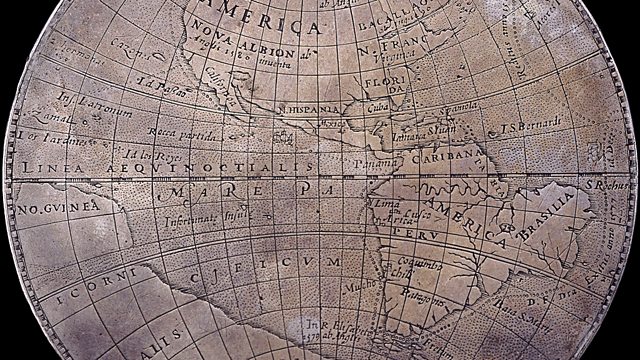2. Communion and Conscience
A communion cup possibly used by the Bard sheds light on dramatic religious changes in the Reformation’s aftermath. From 2012.
The Stratford Chalice. The communion cup that Shakespeare may well have used, sheds light on the dramatic religious changes that came in the aftermath of the Reformation
Object-based history series presented by Neil MacGregor, former Director of the British Museum.
Taking artefacts from William Shakespeare's time, he explores how Elizabethan and Jacobean playgoers made sense of the unstable and rapidly changing world in which they lived.
With old certainties shifting around them, in a time of political and religious unrest and economic expansion, Neil asks what the plays would have meant to the public when they were first performed.
He uses carefully selected objects to explore the great issues of the day that preoccupied the public and helped shape the works, and he considers what they can reveal about the concerns and beliefs of Shakespearean England.
Producer: Paul Kobrak
First broadcast on Βι¶ΉΤΌΕΔ Radio 4 in April 2012.
Last on
More episodes
Previous
The Stratford Chalice
Date: 1571-2
Made in: London
Made by: Unknown
Material: Silver
Size: Cup H:127mm, W:72mm Paten H:32mm, W:76mm Μύ
Μύ
For Elizabethans, the communion cup was central to the Protestant religious service. Every parishioner was obliged to sip from it: a new communal experience, and one that everybody had to join in.
Μύ
This silver communion cup is from Holy Trinity Church in Stratford upon Avon. It was brought to Stratford when Shakespeare was a boy as part of a nationwide campaign to tell England that Catholicism was out – and the Protestant reformation under Elizabeth was back and here to stay.
Μύ
An object like this takes us closer to Shakespeare's daily life – he may even have drunk from it – and helps us imagine what life was like when private belief and practice was inseparable from national politics.
Μύ
This object is from the Holy Trinity Church, Stratford upon Avon
Μύ
Quotations
'Stay, give me drink. Hamlet, this pearl is thine./Here's to thy health!/Give him the cup.'
Hamlet, Act 5 Scene 2 Μύ Μύ
Μύ
'It is the poisoned cup. It is too late.'
Hamlet, Act 5 Scene 2
Background
- Shakespeare could conceivably have taken communion from this cupΜύ
- Shakespeare seems never to have left Stratford, in the sense that his family and main home remained there (he lived in relatively inexpensive lodgings in London)Μύ
- His wealth came from his position as actor and sharer in the company, not as a playwrightΜύΜύ
- Shakespeare's two daughters were married in Holy Trinity Church. His son, Hamnet, was buried in the churchyardΜύ
- Shakespeare is buried in front of the altar alongside his wife, Anne Hathaway
More from Radio 4: The Reformation

How does a highly religious society cope when almost every aspect of its religious practice is changed? Melvyn Bragg investigates the effect of the Reformation on ordinary people.
Μύ
More from Radio 4: Puritans

Re-examining the myth that the lives of Puritans were uneventful, Dr Justin Champion investigates their ambitions for social reform and the dream of 'Godly cities'.
Μύ
More from Radio 4: Faith

Will explores the monarch's relationship with the church through the centuries, seeing how hard successive rulers have worked to make sure religion stayed on their side.
Μύ
More from Radio 4: The Commission

James Naughtie visits Hampton Court to tell the story of how and why King James commissioned a translation of the Bible that has become our "national epic".
Μύ
More from Radio 4: Reformation centenary broadsheet

Neil MacGregor is exploring the co-existence of faiths around 400 years ago. Today - a woodblock print marking a hundred years of the Protestant reformation.
Μύ
Broadcasts
- Tue 17 Apr 2012 13:45Βι¶ΉΤΌΕΔ Radio 4
- Tue 17 Apr 2012 19:45Βι¶ΉΤΌΕΔ Radio 4
- Tue 9 Oct 2012 14:15Βι¶ΉΤΌΕΔ Radio 4 Extra
- Tue 10 Mar 2015 14:15Βι¶ΉΤΌΕΔ Radio 4 Extra
- Wed 11 Mar 2015 00:15Βι¶ΉΤΌΕΔ Radio 4 Extra
- Tue 14 Jun 2016 13:45Βι¶ΉΤΌΕΔ Radio 4
- Tue 17 Apr 2018 14:15Βι¶ΉΤΌΕΔ Radio 4 Extra
- Wed 18 Apr 2018 02:15Βι¶ΉΤΌΕΔ Radio 4 Extra
- Tue 17 Oct 2023 07:15Βι¶ΉΤΌΕΔ Radio 4 Extra
- Tue 17 Oct 2023 12:15Βι¶ΉΤΌΕΔ Radio 4 Extra
- Tue 17 Oct 2023 17:15Βι¶ΉΤΌΕΔ Radio 4 Extra
- Wed 18 Oct 2023 02:15Βι¶ΉΤΌΕΔ Radio 4 Extra
Podcast
-
![]()
Shakespeare's Restless World
Neil MacGregor uncovers the stories 20 objects tell us about Shakespeare's world.


